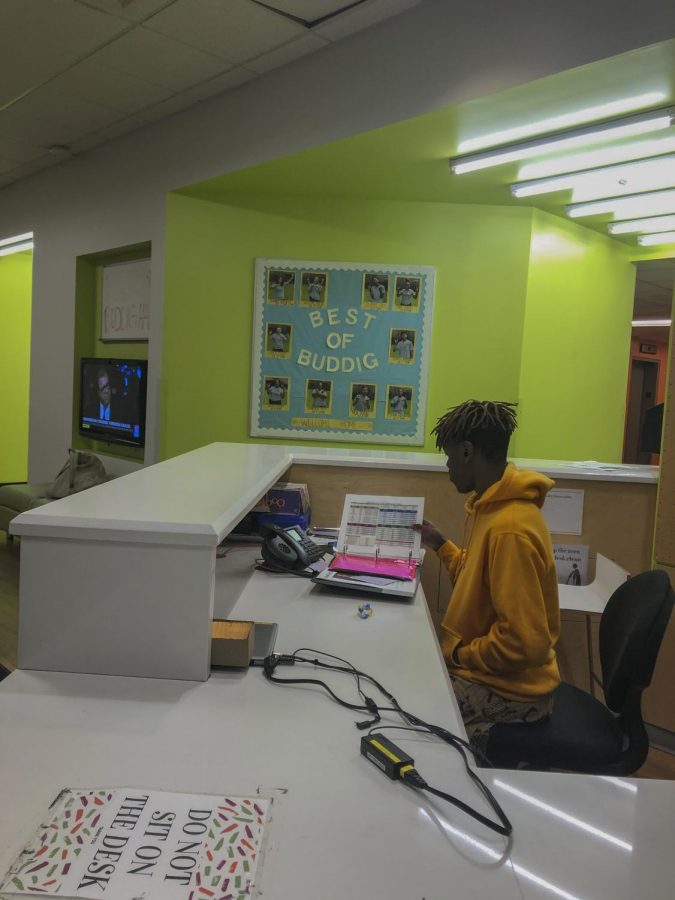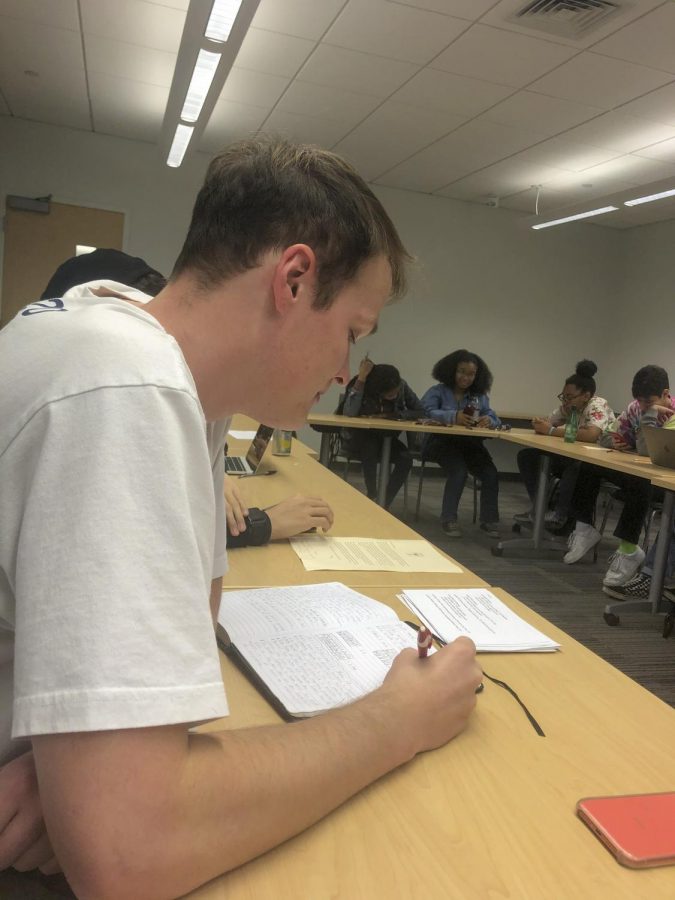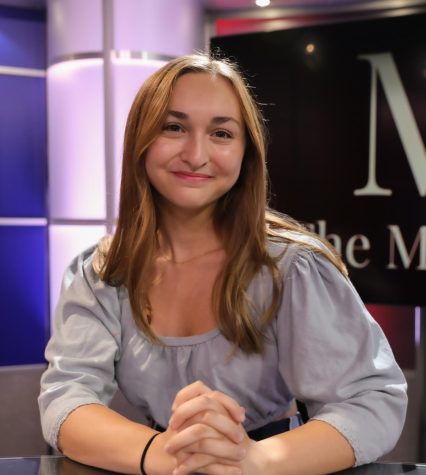Student veterans camouflage with the Wolf Pack
Caleb Kinneman, finance freshman, takes notes in his American Empire class. Kinneman uses personal anecdotes of his time in the Pacific to support his point in class discussion. Photo credit: Rae Walberg
November 18, 2019
Veterans walk the same halls and take the same classes, but their previous careers remains unknown to most students.
Mass communication junior Chris Gilyard believes students fail to acknowledge veterans because they don’t have a strong presence on campus.
“I don’t think that really students know who the veterans are,” Chris Gilyard said. “Maybe cause I’m so young at being considered a veteran that most of the older veterans, they don’t live on campus, they come and handle their business then they go home.”
According to director of student records and certification officer for veterans administration Kathy Gros, many student veterans struggle to find a community because they can no longer relate to 20-year-olds and those who are just out of high school.
“Many of the veterans, some of the issues they will have… they go into the military and they come out with all of these battle scars and they become a freshman,” Gros said. “They are older (and) they are in classes with 18-year-olds.
This was the case for Gilyard who served in the army for three years before being medically discharged after a platform gave way and injured him. When he first came to Loyola, he said there was a culture shock in terms of respect and maturity.
“You meet people who aren’t used to the real world of what’s going on outside of the school’s little circle,” he said. “So I found myself a lot of times having to re-adjust, adjust again to the fact of like how to remember what it felt like to be a civilian before I went into the military.”
He said that support from other veterans, visiting Veterans Affairs and befriending college students helped him adjust. Gilyard is also an active voice on Loyola’s campus being involved in Health Advocates, National Association of Black Journalists and Residence Hall Association.
Finance freshman Caleb Kinneman, utilizes the Student Veterans Association as a support system.
Following high school, Kinneman joined the Navy and was dispatched to many different countries across the Pacific. While he said the Navy provided him a sense of worldliness, it took an immeasurable toll on his well-being.
“I was on board the USS John S. McCain during its accident a few years back and was part of the medical evacuation team and damage control team,” Kinneman said.
He said the Student Veterans Association serves as an outlet where he can talk about his military experiences.
Luke Van Landschoot also initially struggled to find a community, as a student in his upper 20s and a marine veteran trying to navigate the civilian world.
“It’s tough. It’s challenging to go from being war ready to just being a civilian again,” he said.
At Loyola, Van Landschoot found a community in the Stallings Hall lounge, where he and other student veterans retreat to do homework and pass time between classes.
“A lot of veterans from ages 25 and older that have combat experiences, we all live off campus and we all think, and we react and move in a certain way,” Van Landschoot said. “So it’s kind of …all started from, ‘Hey why don’t we get a lounge going.’”
Van Landschoot refers to the lounge as a place to ease the transitional process because of the available resources and like-mindedness of the community.
His frustration with Veterans Affairs and the idea behind the lounge has inspired him to spearhead efforts to create a stronger veterans community not only at Loyola, but on Tulane’s campus as well.
“I’m trying to bridge the gap, and we are bridging the gap between Loyola and Tulane,” he said. “And what we are really trying to do is just make sure that these resources are available and are being made aware of to the veteran community.”
One of the resources he wants to make available is veteran networking.
“This is to help this transitional process between all of it,” he said. “So at the very end of it you can go off and be an excellent employee, own a business, do whatever you want to do but improve your life for the better.”
Beyond the lounge and Veteran Affairs, the university, under the leadership of Kathy Gros offers veterans priority registration, a $12,000 stipend on top of GI Bill benefits and access to counseling.
According to Gros, the resources Loyola provides for its veterans has made it a top-rated veteran friendly university.
“I think that’s just because of Loyola itself, we care,” Gros said. “They are not just a number here. It’s a good place for veterans, many of our veterans start here and they finish here.”
Both Kinneman and Van Landschoot credit Gros for providing needed resources to the veteran community and making Loyola a welcoming university.
Even though veterans remain unseen on Loyola’s campus, they continue to make a difference, but as regular students.
“I’d like to consider myself a very wise person,” Gilyard said. “I try to extend that wisdom to other students on campus as well as just be someone that someone can confide in to.”










Lynn E Estep • Nov 21, 2019 at 10:16 am
It breaks my heart when I hear my grandson talk about the John McCain fiasco. I’m sure it left him battered in body and soul and I hope he and all the other veterans are getting help for their PTSD. He is handling the trauma inflicted on him with maturity and grace and I am so proud of him. Thank you, Loyola for welcoming him into your midst.